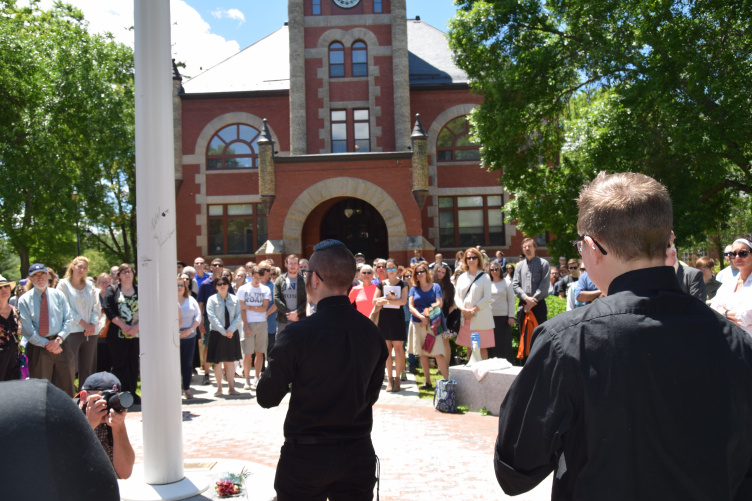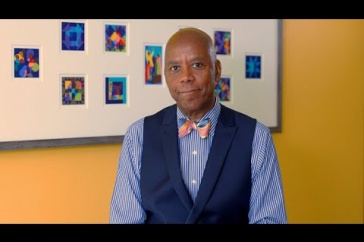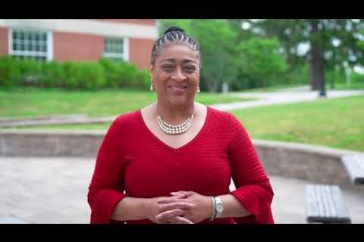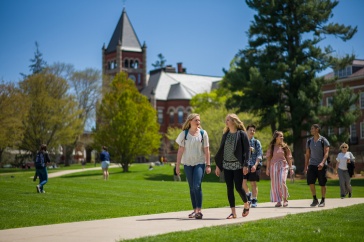
UNH senior Casey O'Dea addressing the UNH community.
What do you say, really, in the face of such utter senselessness? What do you say when there is no language, no vocabulary that can explain or comfort or adequately capture the horror of an act that takes the lives of innocent people?
What can you do other than heed the words spoken by university chaplain Larry Brickner-Wood when he addressed members of the UNH community as they gathered Tuesday to honor the 49 victims of the Orlando nightclub shooting.
You can cry.
“Please cry,” Brickner-Wood said. “Regardless of your social identity, please cry. Because what other response is there?”
Sadness. Bewilderment. Anger. Fear.
All of those emotions were triggered for UNH senior Charlie Durkin when he received a text from his best friend back home. After learning of the Orlando shootings, she wrote, “Hey, promise me you’ll be careful out there, OK?”

“This really stuck with me because it really doesn’t matter how careful I am or how careful anyone is if they are walking around with a target on their back just for living,” said Durkin, a biomedical sciences major on the pre-med track who is vice president of TransUNH and student coordinator for UNH Safe Zones.
“It's really hard not to think that it could have been me. It could have been one of my friends, a family member, anyone close to me. It reminds me that we really have no place to truly call a safe space.”
Friend and fellow senior Casey O’Dea, who was with Durkin at the vigil, shared a comment with the crowd made by his cousin, who often performed at Pulse, the gay nightclub in Orlando where the shooting took place.
So Much More Than Hate
Charlie Durkin ’17 was among those in the UNH community who gathered Tuesday to honor the 49 victims of the mass shooting at a gay nightclub in Orlando. As someone who identifies as queer, polyamorous, and transgender, the act of violence was personal.
“He said, ‘I am no longer a drag queen, I’m a drag warrior,’” said O’Dea, a women’s studies major and president of TransUNH. “I think that this was absolutely a hate crime, it was an act targeted at a specific group of people — queer people of color — it wasn't an random act. It isn't safe to be a queer person in this country and being a queer person of color makes you an even bigger target.”
The fear Susannah Swearingen spoke of wasn’t for her. Instead she worried for our country, and a pattern of history being replicated.

“I’m really scared right now,” said Swearingen, a doctoral candidate in the history department who was raised in the south and recalls prejudice and discrimination. She compared her time growing up in Pensacola, Florida, to the movie, “The Help.”
“That was my life. We had a domestic. I remember the bathroom discussion,” she said, adding, “I see our country on a trajectory to go back to that, and I see it as my job to make sure students understand what those years were about. I take it as my responsibility as a teacher to show students that there are patterns in history and they need to be aware of them.”
Others expressed fierceness, a will to stand up to violence and hatred. Paul Cody of the UNH Counseling Center and an activist for 38 years told the crowd he felt overwhelmed by what he called an act of hate. Quoting the 19th century organizer Mary “Mother” Jones, he said, “Pray for the dead and fight like hell for the living.”
And there was a version of a quote attributed to Benjamin Franklin: "Those who exchange liberty for safety deserve neither.”
Cari Moorhead, associate dean of the graduate school, reminded those in attendance that the university has long been a supportive environment for underrepresented members of its community.
“For years we have worked hard at UNH, in all its locations, to create spaces where people can be honored as whole beings,” Moorhead said. “While we recognize that certain populations experience particular challenges, we also recognize that we are strongest when we all work together to address issues that impact our constituent parts.
In the end Durkin said, “We are not warriors because we want to be. We are warriors because we have to be.”“
"Man’s inhumanity to man makes countless thousands mourn” ~ Robert Burns, 1784
-
Written By:
Jody Record ’95 | Communications and Public Affairs | jody.record@unh.edu



















































